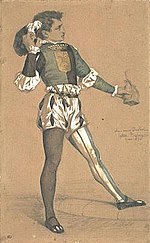


Camille du Locle (16 July 1832 – 9 October 1903) was a French theatre manager and a librettist. He was born in Orange, France. From 1862 he served as assistant to his father-in-law, Émile Perrin, at the Paris Opéra. From 1870, he was co-director at the Opéra-Comique with Adolphe de Leuven, and sole director from 1874 to 1876. He is best remembered for mounting the original production of Bizet's Carmen in 1875. [1]
Du Locle was responsible for completing the libretto of Giuseppe Verdi's Don Carlos (1867) after the death of Joseph Méry. [1] He also played a key role in the genesis of Aida in 1869–70. [2]
According to Charles Pigot, Du Locle inspired the subject, words and music of Bizet's Djamileh (1872). [3] He was a pall-bearer at Bizet's funeral in 1875 and made a speech at his interment at Père Lachaise. [4]
In 1876, a financial dispute arose with Verdi, [5] and Du Locle moved to Capri, where he constructed and lived in the Villa Certosella, now a hotel. [6] In Capri he was known for his reclusiveness, short temper, and sharp tongue. He often went around in a French suit, causing him to be regarded as a bit eccentric. One day he started attracting attention by wearing a suit and cape made of rough, uncoloured wool, a fabric usually only worn by fishermen. Soon many of the Germans and English on the island adopted attire made of similar material, which stimulated a local industry of hand-woven wool cloth which persisted until machine-made fabrics took over several decades later. [7]
His friendship with Ernest Reyer led to him providing libretti for Sigurd (1884) and Salammbô (1890). [1]
Du Locle died in Capri in 1903. [1]
Notes
- ^ a b c d Huebner 1992.
- ^ Budden 1985, p. 105.
- ^ Dean 1978, pp. 94–95.
- ^ Dean 1978, p. 128.
- ^ Budden 1985, pp. 107, 119–120.
- ^ "Capri's famous visitors", Capri On Line. Archive copy (22 April 2019).
- ^ Steegmuller 1982, p. 260.
Bibliography
- Budden, Julian (1985). Verdi. London: J M Dent & Sons. ISBN 9780195323429.
- Dean, Winston (1975). Bizet. Lond, Melbourne, and Toronto: J. M. Dent & Sons. ISBN 9780460031639.
- Huebner, Steven (1992). "Du Locle, Camille", vol. 1, p. 1272, in The New Grove Dictionary of Opera, four volumes, edited by Stanley Sadie. London & New York: Macmillan. ISBN 9780935859928. ISBN 9780195221862 (1998 paperback).
- Steegmuller, Francis, editor and translator (1982). The Letters of Gustave Flaubert: 1857-1880. Cambridge, Massachusetts: Harvard University Press. ISBN 9780674526402.
External links
You can help expand this article with text translated from
the corresponding article in French. (February 2020) Click [show] for important translation instructions.
|



Camille du Locle (16 July 1832 – 9 October 1903) was a French theatre manager and a librettist. He was born in Orange, France. From 1862 he served as assistant to his father-in-law, Émile Perrin, at the Paris Opéra. From 1870, he was co-director at the Opéra-Comique with Adolphe de Leuven, and sole director from 1874 to 1876. He is best remembered for mounting the original production of Bizet's Carmen in 1875. [1]
Du Locle was responsible for completing the libretto of Giuseppe Verdi's Don Carlos (1867) after the death of Joseph Méry. [1] He also played a key role in the genesis of Aida in 1869–70. [2]
According to Charles Pigot, Du Locle inspired the subject, words and music of Bizet's Djamileh (1872). [3] He was a pall-bearer at Bizet's funeral in 1875 and made a speech at his interment at Père Lachaise. [4]
In 1876, a financial dispute arose with Verdi, [5] and Du Locle moved to Capri, where he constructed and lived in the Villa Certosella, now a hotel. [6] In Capri he was known for his reclusiveness, short temper, and sharp tongue. He often went around in a French suit, causing him to be regarded as a bit eccentric. One day he started attracting attention by wearing a suit and cape made of rough, uncoloured wool, a fabric usually only worn by fishermen. Soon many of the Germans and English on the island adopted attire made of similar material, which stimulated a local industry of hand-woven wool cloth which persisted until machine-made fabrics took over several decades later. [7]
His friendship with Ernest Reyer led to him providing libretti for Sigurd (1884) and Salammbô (1890). [1]
Du Locle died in Capri in 1903. [1]
Notes
- ^ a b c d Huebner 1992.
- ^ Budden 1985, p. 105.
- ^ Dean 1978, pp. 94–95.
- ^ Dean 1978, p. 128.
- ^ Budden 1985, pp. 107, 119–120.
- ^ "Capri's famous visitors", Capri On Line. Archive copy (22 April 2019).
- ^ Steegmuller 1982, p. 260.
Bibliography
- Budden, Julian (1985). Verdi. London: J M Dent & Sons. ISBN 9780195323429.
- Dean, Winston (1975). Bizet. Lond, Melbourne, and Toronto: J. M. Dent & Sons. ISBN 9780460031639.
- Huebner, Steven (1992). "Du Locle, Camille", vol. 1, p. 1272, in The New Grove Dictionary of Opera, four volumes, edited by Stanley Sadie. London & New York: Macmillan. ISBN 9780935859928. ISBN 9780195221862 (1998 paperback).
- Steegmuller, Francis, editor and translator (1982). The Letters of Gustave Flaubert: 1857-1880. Cambridge, Massachusetts: Harvard University Press. ISBN 9780674526402.
External links
You can help expand this article with text translated from
the corresponding article in French. (February 2020) Click [show] for important translation instructions.
|